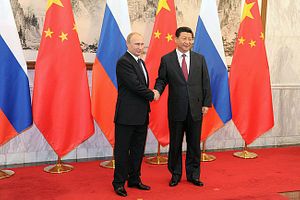As Ankit noted on our Flashpoints blog today, the U.S., Japan, and Australia took advantage of the G20 summit in Brisbane to hold a trilateral meeting where their top leaders promised increased military cooperation. While the three allies were getting cozy, two countries were on the outside looking in: China and Russia. China had to face barbs from U.S. President Barack Obama about perceived Chinese aggression in maritime disputes as well as China’s economic manipulations. Meanwhile, Russia remains at odds with many G20 nations dues to its role in the ongoing instability in eastern Ukraine.
China and Russia may have predicted that the G20 summit would not be the warmest experience for either of them – they seem to have planned ahead by sending Russian Defense Minister Sergei Shoigu to Beijing at around the same time. The message is clear: China and Russia may both be more or less estranged from the Western powers, but they have each other. China and Russia have grown increasingly close, especially as Western criticisms of and sanctions against Russia pile up in the wake of Moscow’s annexation of Crimea. The trend dates back further than that, however; in 2012, Shoigu chose China as the destination for his first trip abroad after assuming the post of defense minister.
Chinese President Xi Jinping is currently traveling, having attended the G20 summit himself before heading to visit Pacific Island nations. Shoigu met instead with China’s number two, Premier Li Keqiang. That meeting was short on substance – understandably so, since Li is generally in charge of economic affairs rather than defense and security. However, Li did reiterate China’s commitment to work with Russia “to consolidate mutual trust, promote concrete cooperation, and strengthen communication on major international and regional affairs.” China and Russia have already pledged to carry out unspecified “important military cooperation projects” in 2015 to celebrate the 70th anniversary of the end of World War II.
Shoigu also met with his Chinese counterpart, Defense Minister Chang Wanquan. Chang praised the “pragmatic cooperation” China and Russia enjoy in military-to-military relations, including “high-level visits, joint exercises and professional communication.” He called for joint efforts to bring military relations “to a higher level.” Both countries reiterated their wish for the China-Russia relationship, including the military relationship, to contribute to maintaining “regional peace and stability.” In other words, China and Russia shared the same stated goal as the U.S. and its allies – a peaceful, stable Asia-Pacific – but have very different views on how to get there.
The commitment to increased China-Russia military ties comes after another warm meeting between President Xi and Russian President Vladimir Putin. The two men met last week on the sidelines of the APEC summit in Beijing, where they described the “evergreen” friendship between their countries. “No matter how the international landscape shifts, we must insist on giving priority to the development of Sino-Russian ties in our diplomatic endeavors,” Xi told Putin.
At the same time, China National Petroleum Corp. and Russia’ Gazprom signed an energy deal that will see China importing natural gas from Russia for the next 30 years, further linking the two Asian giants through their energy cooperation.

































